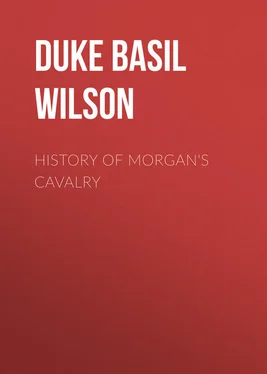Basil Duke - History of Morgan's Cavalry
Здесь есть возможность читать онлайн «Basil Duke - History of Morgan's Cavalry» — ознакомительный отрывок электронной книги совершенно бесплатно, а после прочтения отрывка купить полную версию. В некоторых случаях можно слушать аудио, скачать через торрент в формате fb2 и присутствует краткое содержание. Издательство: Иностранный паблик, Жанр: foreign_antique, foreign_prose, на английском языке. Описание произведения, (предисловие) а так же отзывы посетителей доступны на портале библиотеки ЛибКат.
- Название:History of Morgan's Cavalry
- Автор:
- Издательство:Иностранный паблик
- Жанр:
- Год:неизвестен
- ISBN:нет данных
- Рейтинг книги:3 / 5. Голосов: 1
-
Избранное:Добавить в избранное
- Отзывы:
-
Ваша оценка:
- 60
- 1
- 2
- 3
- 4
- 5
History of Morgan's Cavalry: краткое содержание, описание и аннотация
Предлагаем к чтению аннотацию, описание, краткое содержание или предисловие (зависит от того, что написал сам автор книги «History of Morgan's Cavalry»). Если вы не нашли необходимую информацию о книге — напишите в комментариях, мы постараемся отыскать её.
History of Morgan's Cavalry — читать онлайн ознакомительный отрывок
Ниже представлен текст книги, разбитый по страницам. Система сохранения места последней прочитанной страницы, позволяет с удобством читать онлайн бесплатно книгу «History of Morgan's Cavalry», без необходимости каждый раз заново искать на чём Вы остановились. Поставьте закладку, и сможете в любой момент перейти на страницу, на которой закончили чтение.
Интервал:
Закладка:
On the evening of the 20th or 21st of January, Captain Morgan with five men left his camp at Bell's tavern, crossed the Green river at an unguarded ferry, and on the following day rode into Lebanon, some sixty miles from his point of departure. Several hundred troops were encamped near this place, and a great many stores were in the town and in a large building between the town and the nearest camp. The soldiers off or on duty were frequently passing to and fro through the town. Morgan destroyed the stores, and made all the stragglers prisoners; some of them he was obliged to release after taking their overcoats, with which he disguised his own men and was thus enabled to get quietly through some dangerous situations. He brought back with him nine prisoners, a large flag and several other trophies. Two companies of cavalry followed him closely, but he gained the river first, crossed and turned the boat adrift, just as his pursuers reached the bank. Next day he marched into Glasgow with his five men and nine prisoners in column, and the United States flag flying at the front. He scared the citizens of the place and two or three straggling Confederates, who were there, horribly. The flag and blue overcoats demoralised them.
When he reached his own camp the prisoners were quartered with different "messes," but were not placed under regular guard. The inmates of each tent, in which prisoners were placed, were held responsible for them. On this occasion it happened that some of the men (by means in which they were learned and adroit) had obtained several bottles of wine – sparkling catawba – and the prisoners were assured that this sort of wine was regularly issued to the Confederate cavalry by their commissaries. They approved the wine and the practice of including it in soldiers' rations, and five of them next morning begged, with tears in their eyes, to be received into the Confederate service. These adventures are not related because it is thought that they will excite any especial interest, but because they fairly represent the nature of the service in which Morgan was constantly engaged during the occupation of Southern Kentucky by the Confederate army, in the fall of 1861, and the greater part of the succeeding winter.
Although greatly inferior in dash and execution to the subsequent cavalry operations of the West, this service of Morgan's was much superior, in both, to any thing which had, up to that time, been attempted by either side, and it served to educate Morgan's men and Morgan himself for the successful conduct of more daring and far more important enterprises.
A strong and mutual feeling of regard and friendship commenced (during the period that we served with General Hindman), between the Eighth Texas (Terry's Rangers), and the squadron, which continued to the close of the war, growing warmer as Morgan's command grew in numbers, and, doubtless, it exists, now, in the hearts of the men, who composed the two organizations. This feeling interfered in some degree with discipline, for most of the men of both were young and wild, and inclined, when they could evade the vigilance of camp guards, to rove nocturnally and extensively, and neither, when on picket, would arrest or stop their friends from the other command.
The gallant Rangers paid dearly for their proud record, and few of those who used to roam and fight so recklessly then, are, I fear, living now, to recall the events which we witnessed together. The squadron remained with the forces under command of General Hindman until the evacuation of Bowlinggreen and the retreat from Kentucky. Then we left the scenes and the region with which we had become so familiar with sad hearts. We had hoped that when the signal for departure was sounded, it would be also the order to advance; that we would press on to recover the whole of Kentucky, and win victories that would give her to us forever, and the retreat seemed to us like a march to our graves. But a feeling of regret at leaving the country in which we had passed months of such pleasant and stirring service, was natural, even without other reasons for it. Men are apt to become attached to the localities where they have led free and active lives, and to connect with them agreeable associations. This country had many such for us, and that part especially between Bell's tavern on the one side of Green river, and Nolin on the other. For many miles to the right and left there was scarcely a foot of the ground which we had not traversed, nor a thicket in which we had not hidden; from almost every hill we had watched the enemy, and at almost every turn in the road shot at him. These are not precisely the kind of reminiscences that the poetical and romantic sigh over, but every man has a right to be sentimental after his own fashion, and Morgan's men were always mightily so about the Green river country.
CHAPTER VI
In the latter part of January, 1862, it became evident that General Johnson, with the inferior force at his disposal, could not hold his line in Kentucky. Crittenden, upon the right flank, had sustained a serious disaster at Mill Springs, near Somerset, and had been forced back across the Cumberland, which he had crossed to attack Thomas. In this battle General Zollicoffer was killed – his death was in itself an irreparable loss. Crittenden retreated first upon Monticello and subsequently to Gainesville in Tennessee. He lost his artillery and trains, and his troops could be relied on to oppose no effective resistance – for the time – to the farther advance of the enemy. The superiority of the latter in numbers had been not more marked than their superiority in arms and equipment. The fatigue and privation endured by Crittenden's men upon their retreat had contributed greatly to impair their efficiency. The expeditions against Forts Henry and Donelson were vigorously pressed, and scarcely had full confirmation arrived of the defeat of Crittenden, when we got the first rumors of the fall of Fort Henry. General Johnson had never been able to collect at all the points of defense in Kentucky, exclusive of Columbus, more than twenty-four thousand men. In this force were included sixty-days' men and all the minor garrisons. He had at Bowlinggreen in January and the first of February about ten thousand.
Buell had organized, during the period that the two armies lay inactive and confronting each other, fifty or sixty thousand men, and they were, at the time when General Johnson commenced his retreat, concentrated, mobilized, and ready to fall upon him. Therefore, even before it became evident that Donelson must fall, before the capture of Nashville was imminent, by an enemy moving from either flank, and before his line of retreat was endangered, but just so soon as Buell put his army in motion General Johnson evacuated Bowlinggreen. Then began the campaign, in which more than in any other of the war, was displayed the profoundest strategy, the most heroic decision, the highest order of generalship.
General Johnson had long foreseen the storm of difficulties which now assailed him. His resources were scanty and the emergency was terrible, but he did not despair of fighting through it to victory. Upon one flank of his line, he had sustained a crushing defeat, the forces protecting it had been driven off. Nashville might be taken by the victors. One of the forts protecting the great water lines which led right into the heart of his department, and away to the rear of his army, had been taken. If the other fell the fate of Nashville was sealed, but far worse, he would be inclosed at Bowlinggreen, should he remain there, between three armies each much stronger than his own. If he lingered around Nashville, he could not protect the city, but gave his enemy the opportunity of cutting him off completely from the only territory whence he could hope to obtain recruits, and of preventing his junction with the reinforcements which he had ordered to his assistance. He did not hesitate a moment.
Читать дальшеИнтервал:
Закладка:
Похожие книги на «History of Morgan's Cavalry»
Представляем Вашему вниманию похожие книги на «History of Morgan's Cavalry» списком для выбора. Мы отобрали схожую по названию и смыслу литературу в надежде предоставить читателям больше вариантов отыскать новые, интересные, ещё непрочитанные произведения.
Обсуждение, отзывы о книге «History of Morgan's Cavalry» и просто собственные мнения читателей. Оставьте ваши комментарии, напишите, что Вы думаете о произведении, его смысле или главных героях. Укажите что конкретно понравилось, а что нет, и почему Вы так считаете.












